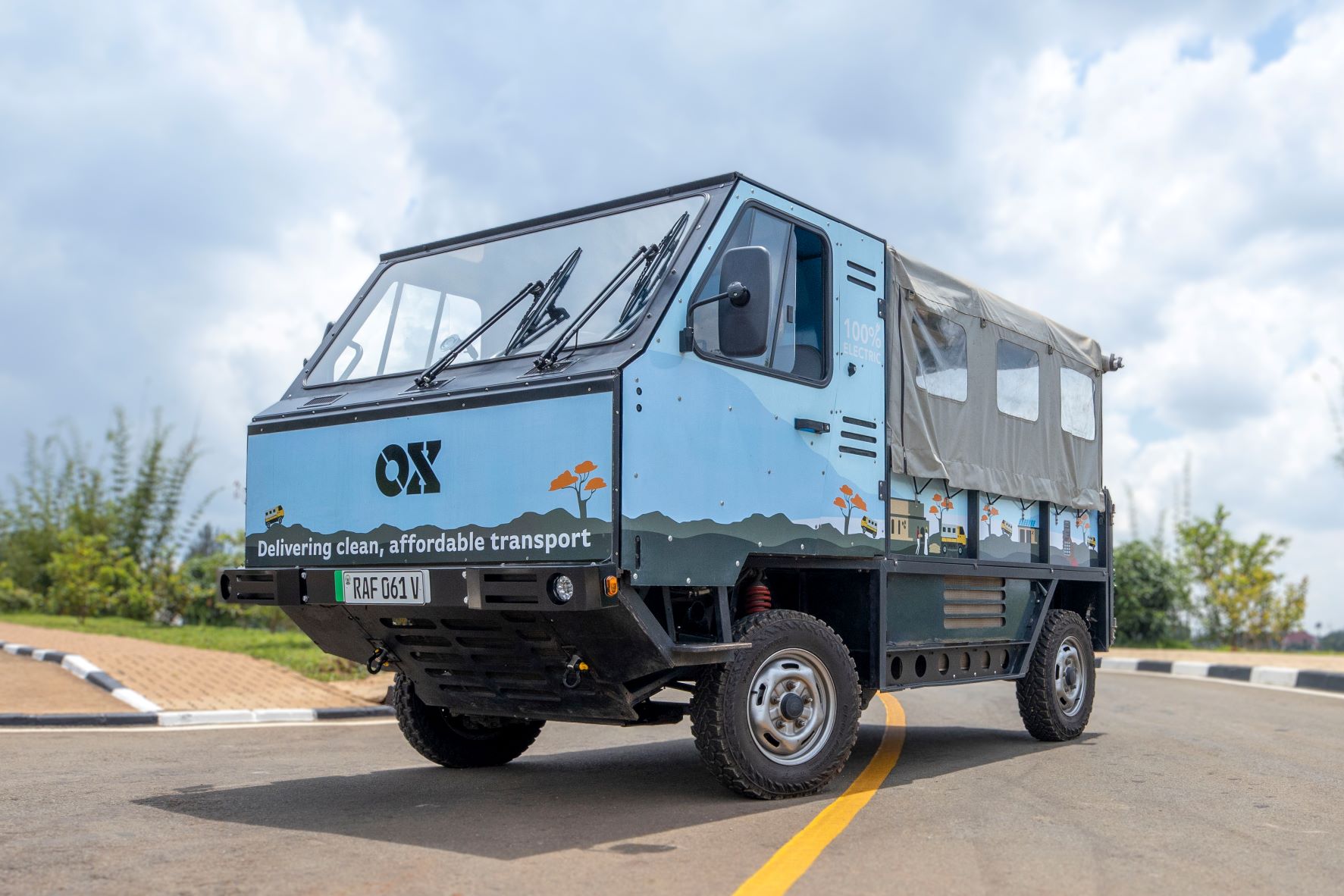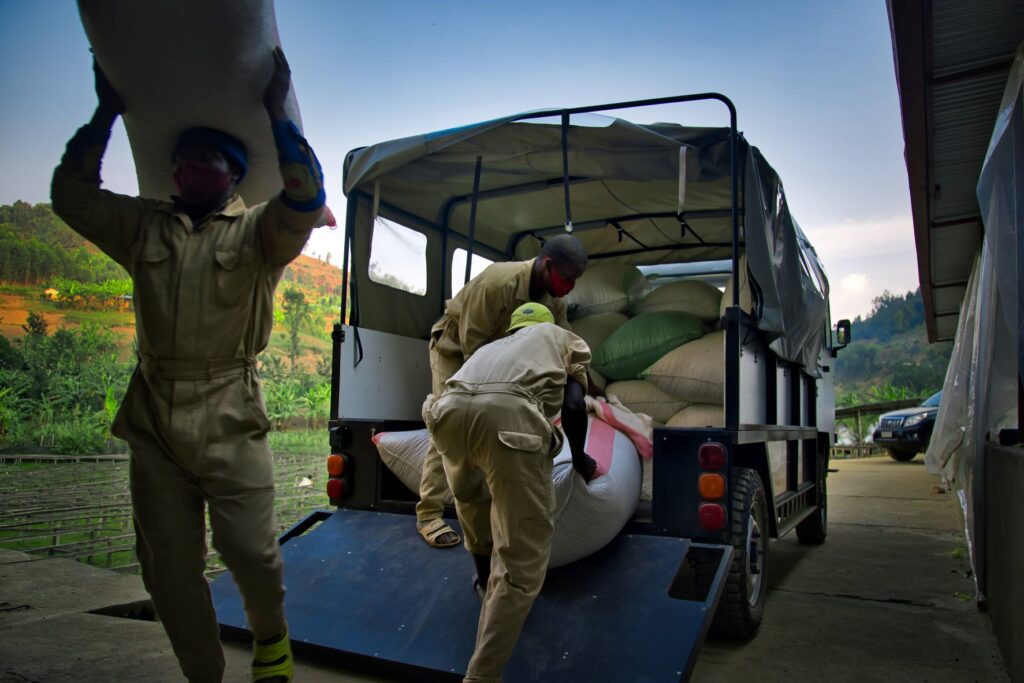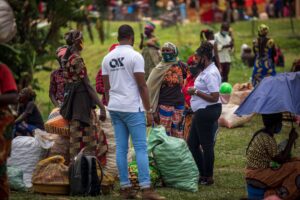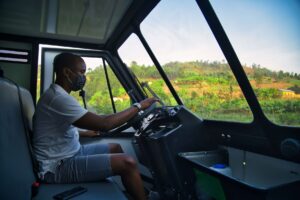GDC member spotlight: OX Delivers

OX Delivers are tackling the last mile distribution transport challenge through their trucks that are uniquely suited to rural frontier and emerging markets. Read on to find out more about how they deliver services to the last mile in Rwanda.
What does OX Delivers do, when did you start operating, and what’s the problem you’re trying to solve?
We started in October 2020, with the aim of designing a truck that is uniquely suited to rural frontier and emerging markets. We’ve started in Rwanda, where conditions are challenging. No manufacturer has produced a truck that focuses on how much the truck costs to own and drive (“Total Cost of Ownership”), so affordability is vital. Since then, we have developed our zero-emissions OX truck, which is specifically designed for these markets. It is capable of navigating extreme terrain in difficult conditions, to reach the most remote places. Since poor infrastructure is one of the key barriers to connecting the last mile to markets, we see this truck as a game-changer for last mile distribution – both in Rwanda and elsewhere.
So, in a nutshell, we provide affordable, reliable and zero-emission transport in rural areas of Rwanda, helping to create economic growth and social impact for local communities. We started operating in Rwanda in March 2021 with a contract to pick up and deliver coffee cherries. 18 months later, we’ve moved 11,500 tonnes of goods into and out of last mile markets: transporting over 25 product categories including animal feed, organic produce, FMCGs, and durable products such as solar home systems and water filters.
Why is the service you provide so invaluable for your smallholder farmer customers?
Around the world, there are billions of people who will never have access to mechanised transport; in Rwanda alone, there are 10 million smallholder farmers in this position. What kinds of social and income-generating opportunities are they missing out on?
Over 80% of our customers are smallholder farmers, who traditionally only sell their goods at markets where they can walk or cycle. Before OX they would put goods on the top of a minibus, on boda-bodas, seek out middlemen to take their goods to cross-border markets, or simply sit by the side of the road and wait for a truck to come along. Using our pre-arranged transport service, these smallholder farmers can more proactively and strategically sell their goods at district, provincial or cross-border markets, securing up to 10x the price they would get at a local market. OX can transport goods for the same cost as a bicycle, but much faster and more reliably. We charge a fixed transport fee per kilogram, depending on the distance travelled, which is easily paid by our customers using mobile money. Once we deliver the goods to our customer’s own client (for instance, the district-level market trader), they are paid as normal
Tell us a bit more about your business model…
We have four depots across Rwanda, each housing up to 10 trucks and each supporting about 30 direct jobs (20-25 Drivers Plus five support staff) and serving around 500 customers. Our EV trucks can charge at the depots overnight, spend the day picking up and dropping off goods along their designated route, and then return to the depot at the end of the day. Depots have profit targets but they are also empowered to manage their own P&L. It’s therefore in their interests to establish collection routes, some of which are planned while others have emerged organically, to drive down costs.

OX truck being unloaded in Rwanda
How do product collections and payments work for your customers?
Take Tuesday as an example, as it’s a typical market day. A couple of days in advance, our customers will have submitted a request to OX that tells us the goods they want to transport and in what quantity, and where the collection and drop-off points are, to help us plan the best route for our truck(s) to take that day. Often, informal cooperatives will gather their goods together and have everything ready for our Drivers Plus to collect from their village gates. If it’s a customer, group of customers, or SME we know and trust, we might collect payment at the end of the day, after the trip, or later in the month according to an agreed payment plan. If it’s a relatively new customer, we require upfront payment at the point of collection. By establishing clear processes, issuing receipts, and entering into MOUs with customers that lay out the service we provide and our expectations in return, we’ve really improved the payment collection process.
It sounds like two-way trust is central to your business model.
Absolutely, the entire business is built on trust – and people. If you’re a smallholder farmer choosing to use our service, you’re entrusting us with something that’s taken a lot of time and effort to grow and is hugely valuable to you and your family. You need to have confidence in the people responsible for transporting it. Engendering this trust is central to what we do, and it happens locally, starting with our DriversPlus. We call our drivers ‘DriversPlus’ because they do so much more than drive: they are also responsible for the upkeep of the vehicles, business development, depot management and, crucially, customer relations.
Our understanding of our customers and their expectations is now excellent, but in the early days, it wasn’t always plain sailing. For example, in one fishing village our cold truck would turn up to collect fresh fish to take to market, and the fishermen wouldn’t yet have been fishing that morning. We came to realise that they had previously been left waiting around for unreliable trucks, which had resulted in food waste and frustration, meaning they lacked faith in our service. Now that they know our cold truck will turn up when we say it will, they always have the fish packed in ice, which they make at the lake shore, and ready to go.
We’ve talked a lot about transporting goods from last mile communities to other parts of the country, to improve your customers’ income-generation potential. Tell us more about leveraging your model to also bring more goods into the last mile.
There is a huge opportunity for the two-way movement of beneficial goods – and FMCGs – via the OX transport system in Rwanda, because we can relatively quickly and cheaply link up Kigali (the hub) with our depots in rural areas (the spokes); leveraging these bases to distribute goods to the last mile. We’ve already done this with solar home systems, animal feed, water filters, and FMCGs. We want to work as efficiently as possible to improve the social and economic outcomes for local communities; this means not only collecting and transporting goods but providing additional services when it makes sense, to ensure we are maximising our model and making market linkages. For example, when we deliver animal feed to smallholder farmers in rural areas, we also collect manure, deliver it to organic farms in Kigali, and then transport goods from these organic farms into Kigali to sell.

OX Rwanda team with their customers
With significant growth on the horizon, mounting interest in OX and, indeed, increasing commercial investment in the company (at the time of writing, OX is gearing up for a Series A raise), how will you balance impact with profit?
Firstly, we select our investors very carefully – we only want to work with people that understand and support the impacts we are striving for. Secondly, we put farmers first. There are 10 million smallholder farmers in Rwanda, and we are currently serving around 1,500 directly – we are only just scratching the surface. It’s important to us that we serve this market segment which has traditionally been overlooked. These farmers represent over 80% of our business. Transaction costs would be lower if we just worked with a handful of large companies, as opposed to hundreds of smallholder farmers or cooperatives, but less than 10% of our business is with corporate contracts (e.g., coffee and timber companies). We are also in the process of becoming B Corp certified, which cements our intentions and will hold us accountable to a range of impact- and climate-focussed global standards moving forwards.
Beyond your day-to-day operations, you are involved in ongoing advocacy efforts to build an effective ecosystem for e-mobility. Why is this so important?
Yes, we’re part of a budding association of e-mobility companies in East Africa working to influence decision-makers to support a shift to e-mobility, and we plan to ramp up these efforts over the coming years. In hindsight, we should have become involved in these conversations sooner. Building an effective ecosystem is not only important for our operations now, but essential for our plans to expand into neighbouring countries in the future, and to secure the longer-term electrification of East Africa’s rural transport system – which we want to be a driving force behind. Like most last mile distributors, we have lots of competing priorities and it is tempting to focus foremost on day-to-day activities. But keeping an eye on the bigger picture, investing time in collaborations, and ensuring we are plugged into upcoming trends and potential partnerships will help us to future-proof ourselves.
We are also generating a wealth of data that can be leveraged; both to finesse our own model, and to inform government decision-making. For example, insights we gather on how much of which product is getting from X to Y can enable governments to understand which roads are being used and aren’t used, and for what purposes, to help them decide which infrastructure to invest in.
You’ve achieved a lot in 18 months. What’s your plan for the next five years?
By 2027 we will have expanded throughout Rwanda and ideally across east Africa. We plan to start with southern Uganda, given its similar terrain and harvest periods to Rwanda, and the political interest in OX there.
Right now, we are serving over 1,500 customers with 15 trucks, and flew past our revenue projections per truck after the first four months of operations – which just goes to show that the demand for this service at the last mile is fierce! We are on our way to having fully profitable depots, which will only be enhanced when all our trucks are electric (as of October 2022, we have 1 EV truck and the rest are diesel. We’ll have two more EV trucks in early 2023, and a total of 9 by the end of 2023). Given the level of demand we are experiencing, we think it’s realistic that in the next five to ten years we’ll have 2,000 trucks operating in Rwanda alone.

A driver inside the OX truck in Rwanda
What would you say to other stakeholders interested in tackling the transport challenge at the last mile?
Team up with OX! This is not just an issue in Rwanda, or in sub-Saharan Africa – it’s an issue faced across the globe. We are incredibly proud of what we do, what our team has accomplished in less than two years, and the service we provide to last mile customers. But we know that in our lifetime we will only ever be able to offer this service to a fraction of the population living without motorised transport today. Join us!
If you’re interested in finding out more about OX or partnering with them to deliver services at the last mile, get in touch with Natalie Dowsett, OX Co-Founder and Head of Business Growth, at: natalie@oxdelivers.com
